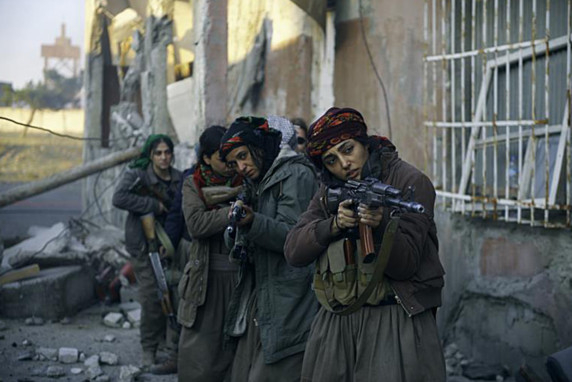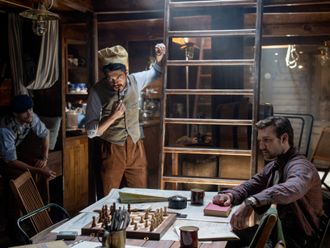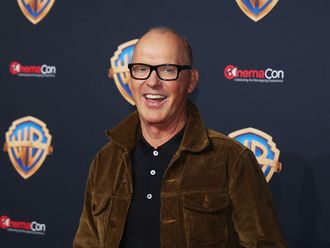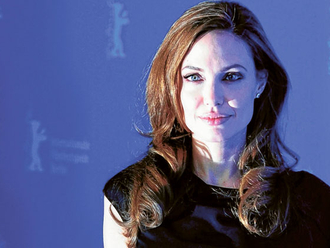
The prestigious Cannes Film Festival has had a tumultuous couple of years.
This time around, Cannes introduced a rule that requires films in competition to have a theatrical release before streaming. This drew the ire of Ted Sarandos, Netflix’s chief content officer, who would prefer for the platform’s films to be released in both venues simultaneously — and so he withdrew Netflix’s films from the festival altogether. It’s a uniquely 21st-century battle.
But another long-standing issue of exclusion persists amid all this hubbub — of the 18 films in competition this year, only three were directed by women. This is the same number of female filmmakers to compete last year, when The Beguiled made Sofia Coppola the second-ever woman to win the Cannes best director prize. The festival has been around for 71 years.
Two of the three women this year — Nadine Labaki, Alice Rohrwacher and Eva Husson — have competed previously. Lebanese actress-turned-director Labaki will show Capernaum, which explores the lives of migrants in Beirut. A graduate of the festival’s Residence programme, Labaki served on the jury in 2015 and has screened two films before: Caramel in 2007 and Where Do We Go Now? in 2011. Italian writer-director Rohrwacher will return with the time-travelling drama Happy, Lazzaro. Rohrwacher’s coming-of-age debut Corpo Celeste premiered 2011, and rural drama The Wonders won the Grand Prix, an award second only to the Palmer d’Or, in 2014.
French director Husson will make her Cannes debut with Girls of the Sun, which follows a Kurdish female battalion that fights against extremist captors. Husson’s first film, Bang Gang, received positive reviews at the Toronto International Film Festival in 2015.
Cannes artistic director Thierry Frmaux remarked at a news conference that the world “will never be the same again” after sexual assault allegations against Harvey Weinstein boosted the #MeToo movement. But he added that the industry’s related gender inequality issues and the lack of female filmmakers represented at Cannes had nothing to do with one other.
“There are not enough women directors, but we don’t have time to talk about that here,” Frmaux said. “Our point of view is that the films are selected for their intrinsic qualities. There will never be a selection with a positive discrimination for women.”
IndieWire wrote that even with those qualities in mind, it remains surprising to see Naomi Kawase and her Juliette Binoche-starring Vision snubbed. The Japanese director frequents Cannes, having previously shown seven films. Claire Denis’ Robert Pattinson-starring sci-fi drama High Life, which coincidentally features Binoche as well, was also left off the list — though the Hollywood Reporter noted this might have been due to a postproduction delay.
As Frmaux pointed out, there are likely a good number of women on the jury — and Cate Blanchett, who earlier this year helped launch the Time’s Up initiative to combat sexual misconduct, will be the 12th woman to serve as its president. But the same has never been true of the actual competitors. The only woman who received the directing prize before Coppola was Soviet filmmaker Yuliya Solntseva, who won in 1961 for her depiction of Soviet resistance to the Nazi movement in Chronicle of Flaming Years. And in a pre-written speech, Coppola reportedly thanked Jane Campion, the only woman in Cannes history to win the Palme d’Or (for The Piano).
This history has not gone unnoticed. French actress Isabelle Huppert, an Oscar nominee and Golden Globe winner for Elle, received the Women in Motion Award last year. At the festival’s 70th anniversary celebration, she reportedly exclaimed, “70 years, 76 Palme d’Ors, but only one has gone to a woman — no comment.”
Nicole Kidman, who had four separate projects at Cannes last year, urged support for female directors. At the time, she told the Sydney Morning Herald it was necessary for her to be able to say that “pretty much every 18 months, I’m making a movie with a female director,” and later elaborated during a news conference for The Beguiled.
“Only 4.2 per cent of women directed the main motion pictures of 2016, that’s a statistic from the Women in Film group,” she said, according to the Guardian. “There were 4,000 episodic television series last year and only 183 women directed them. ... We as women have to support female directors. Hopefully it will change over time, but everybody keeps saying, ‘Oh it’s so different now, oh it’s so different now,’ and it isn’t.”
Jessica Chastain served as a jury member last year and boldly addressed the issue of female representation, according to Vanity Fair, calling it “quite disturbing” to see how women were treated in the 20 films she watched.
“When we include more female storytellers, we will have more of the women I recognise in my day-to-day life — ones that are proactive, have their own agencies, don’t just react to the men around them,” she said. “They have their own point of view.”
——————————
SO, WHO MAKES THE CUT?
Spike Lee and Jean-Luc Godard will compete for the Palme d’Or at Cannes next month, but a posthumous movie by Orson Welles will not be screened due to a dispute between the film festival organisers and Netflix.
The streaming giant had planned to present The Other Side of the Wind, a movie Welles shot in the 1970s but never finished editing, as well as They’ll Love Me When I’m Dead, a documentary about the filmmaker, who died in 1985.
The competition will open with Todos Los Saben (Everybody Knows), a film starring Penelope Cruz and Javier Bardem made in Spain by double-Oscar winning Iranian director Asghar Farhadi.
Among the close to 20 contenders in the main competition is Spike Lee’s BlacKkKlansman, about an African-American police officer who infiltrates the Ku Klux Klan.
At the age of 87, Cannes darling Godard returns with Le Livre d’Image (The Image Book) and Oscar-winning Polish director Pawel Pawlikowski will present Cold War.













